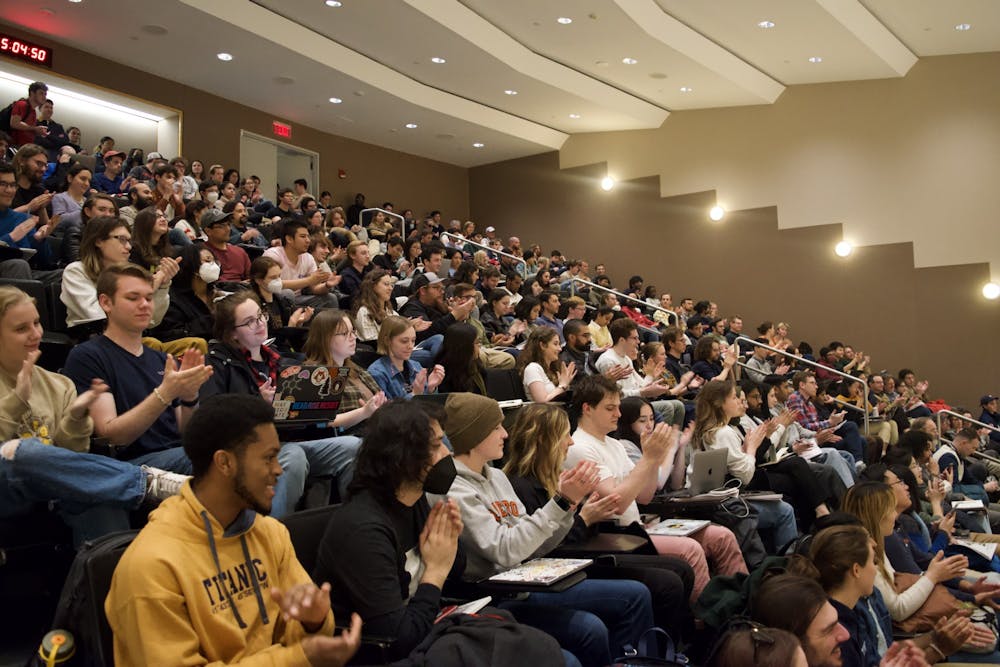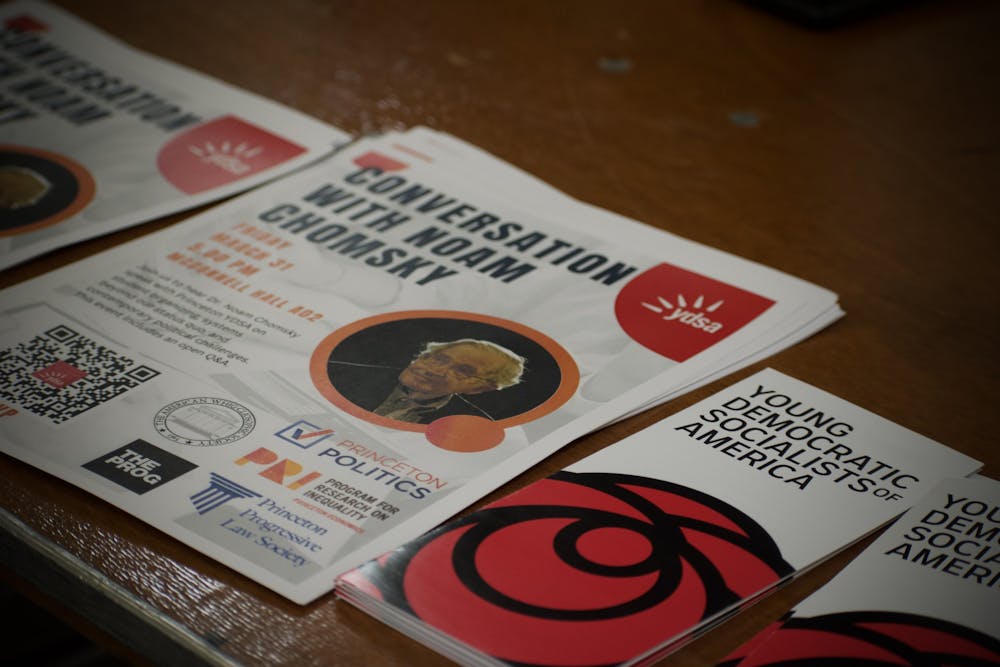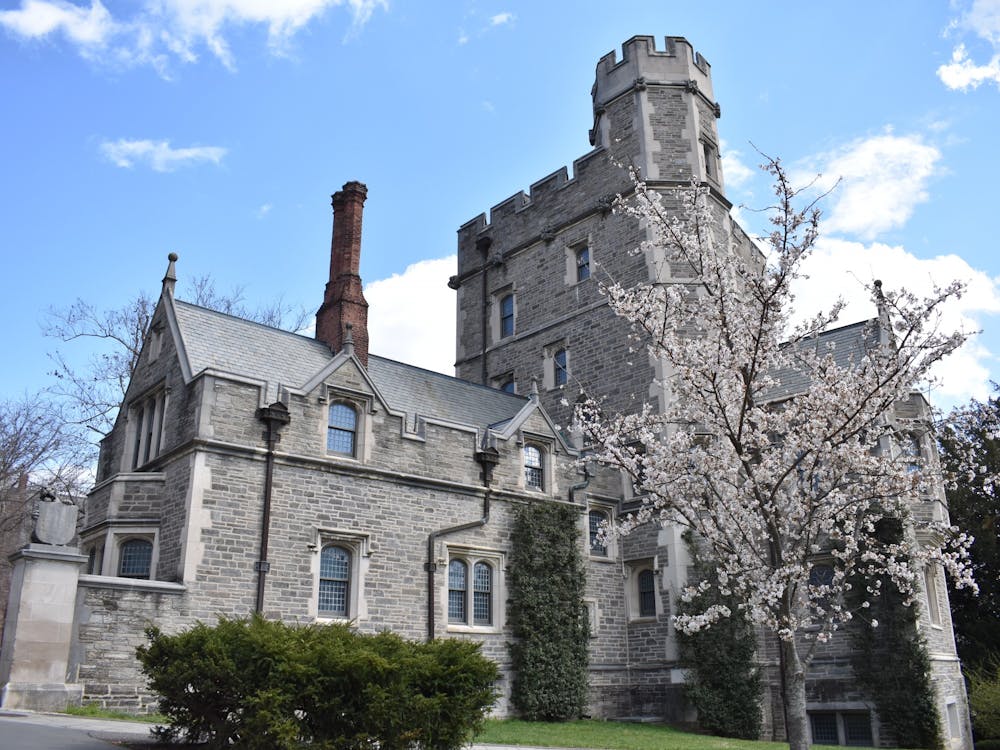Public lectures at Princeton don’t often fill auditoriums. But even appearing via Zoom, Noam Chomsky drew a packed crowd.
Over 300 Princeton University students, Princeton Theological Seminary students, alumni, and local community members gathered to hear Noam Chomsky, “father of modern linguistics,” MIT professor emeritus, historian, activist, and cognitive scientist, speak on Zoom about student organizing, his political ideology, and contemporary political movements. Chomsky lauded higher student engagement on campus and defended socialism at an event co-hosted by Princeton’s relatively new chapter of Young Democratic Socialists of America (YDSA).
Chomsky began by reflecting on the role and trajectory of student organizing among the eight Ivy League colleges. Chomsky suggested that campus activism has increased in recent years. He spent a year in Princeton in 1958 and explained that back then, “no one was raising questions like this. The idea was unimaginable.”
“Students [in the present day] have become active, engaged, and are changing the world considerably,“ he said. Chomsky attributed this to students being at a point in life “free from parental control and exigencies of putting food on the table that is very rare in human life.”
Chomsky said that it is “heartening to think of changes taking place at Princeton since [he] started there.”
Many metrics speak to activism and political engagement within the student body.
Within the past few years, Princeton students and community members have participated in protests on campus, including after the death of George Floyd, in support of divestment from fossil fuels, in solidarity with the Philadelphia MOVE police bombing victims, in support of Ukraine after the Russian invasion, in support and opposition of abortion rights, after the killing Tyre Nichols, and in support Princeton Graduate Students United (PGSU). While over 1,000 protested after the killing of George Floyd, many campus protests are in the range of 100 students, a small fraction of the total student body.
Political engagement on campus has increased on campus in recent years, from 10.5 percent in the 2014 Midterm Election to 75.4 percent in the 2020 Presidential Election, according to Vote100.

In raising the question of how students should deal with imbalance of power, Chomsky explained that one should “work to reverse it,“ and that imbalance of power is “a special case of class struggle and class struggle is always difficult.”
Organized by Princeton’s chapter of the YDSA and co-sponsored by the Department of Politics, the Program for Research on Inequality of the Department of Economics, the Princeton Progressive, the Princeton Progressive Law Society, and the American Whig-Cliosophic Society, the respective groups encouraged the audience to get involved with them before the event. The event was also in partnership with local NGO Unidad Latina en Acción (ULA). Jorge Torres, an organizer with ULA, preceded Chomsky in leading the crowd in a “Unity is Power” chant.
Princeton’s YDSA chapter started in September 2022. Since then, YDSA has hosted Sara Mughal, who helped unionize the Hopewell Township Starbucks, to talk about unionization efforts and striking. YDSA also co-sponsored a panel discussion on the New Jersey Domestic Workers Bill of Rights in November of 2022. The group also joined The College of New Jersey’s (TCNJ) YDSA to host a joint mutual aid drive for The Chubby’s Project in the past and has worked in collaboration with ULA and other progressive groups on events. YDSA represents a farther left campus constituency than the College Democrats or Whig Party.
Torres later told The Daily Princetonian that “these kinds of events open up the mentality of the students to connect with the social issues that are happening.”
“When you are part of such a privileged university sometimes students aren’t connected to what is happening outside, and I think that these kinds of events and issues allow students to think out of the box,” he added.
The packed room did not go unnoticed, especially at a university where public lectures are often sparsely attended. George Dusichka from Our Revolution Mercer County told the ‘Prince’ that “it’s nice to see a full auditorium for an event like this.”
Ian McInnis ’23 told the ‘Prince’ that he came because “Noam Chomsky is a legend, man. [He] is 96, he’s not hanging around … I only wish it were longer.”

Attendees applaud Chomsky during the event
Photo courtesy of Veena Krishnaraj
Chomsky explained that his ideology, which he said is traditionally called libertarian socialism but “you can give it whatever name you like,” boils down to the question “how do people spend their lives?” For most young people, he explained, the aspiration is to get a high paying job.
According to the 2022 Senior Survey, after college, over a quarter of students expected to make six figures. Academia, consulting, and finance stood among the most popular career fields. Nonprofit and public service jobs accounted for only 7.1 percent of jobs after graduating.
Chomsky claimed that the United States is unusual because it has a “powerful and highly class conscious business class and also had a very violent labor history.” Chomsky described how the actions of political leaders including Woodrow Wilson Class of 1879, Ronald Reagan, Jimmy Carter, and Margaret Thatcher have led us to a point in society where “aspirations considered intolerable a century ago are now high aspirations.”
When describing the history of unions, Chomsky explained that they were a social and cultural hub for workers, whose lives centered around these activities, and their decline left people “praying to demagogues, social media, megachurches — other forms of organized irrationality.”
Waree Sethapun ’24 told the ‘Prince,’ “what Noam Chomsky said about the power of unions is new to me. I never really engaged with unions before, and I didn’t realize that there was a lot of culture associated with them before they were wiped out by class wars. So I’ve become more interested in exploring that as a path to change.”
An audience member was interested in how to pursue a career as a politician without enabling U.S. imperialism. Chomsky encouraged using “influence to undermine and eliminate imperial power.” He mentioned that it’s not easy, but it is possible, citing Jamaal Bowman and Bernie Sanders as examples.
On balancing pursuing intellectual pursuits with the desire to improve the world, Chomsky admitted that there is no answer. He noted that “intellectual work is exciting, challenging, and can be of great significance for understanding the world,” but that this is just one part of life and the other part is direct engagement. “There are 24 hours a day. You make compromises, you cut here and there. There’s no answers,” he expressed.
Graduate school was the most popular option for postgraduate plans in the 2022 Senior Survey, with 17.2 percent of students aspiring to work in academia.
Chomsky also spoke about major crises faced by humanity including the climate crisis and nuclear war, saying that “under conditions of currently existing savage capitalism, the only ways to deal with these crises is bribing the rich and powerful.”
At the event co-sponsored by YDSA, Chomsky responded to criticism from those skeptical of the word “socialism” because of ties to Cuba. Chomsky detailed a history of U.S. imperialism in Cuba, critiqued U.S. sanctions on Cuba, and concluded that “there is no socialism in Cuba.”
Chomsky stated that the “essence of socialism is control of working people of production.” Unlike in other countries where socialism is perceived as democratic, the United States “is a deeply indoctrinated country.”

YDSA, student groups, promote themselves at Chomsky event
Photo courtesy of Veena Krishnaraj
Martin Mastnak ’25, a member of YDSA, told the ‘Prince’ that he hopes “students got a renewed spirit to go out and make a difference and maybe look at world issues in a new perspective and be willing to criticize the world and systems we live in.”
“Chomsky has the intellectual perspective many of us are missing in our generations,” he added.
YDSA leaders concluded that “as occupiers of space of privilege, we also occupy space of immense duty. We urge you all to get more involved than you already are.”
The event took place in McDonnell A02 on Friday, March 31, at 5 p.m.
Abby Leibowitz is a staff News writer for the ‘Prince.’
Please send any corrections to corrections[at]dailyprincetonian.com.
Correction: This piece has been updated to clarify details about the event.








